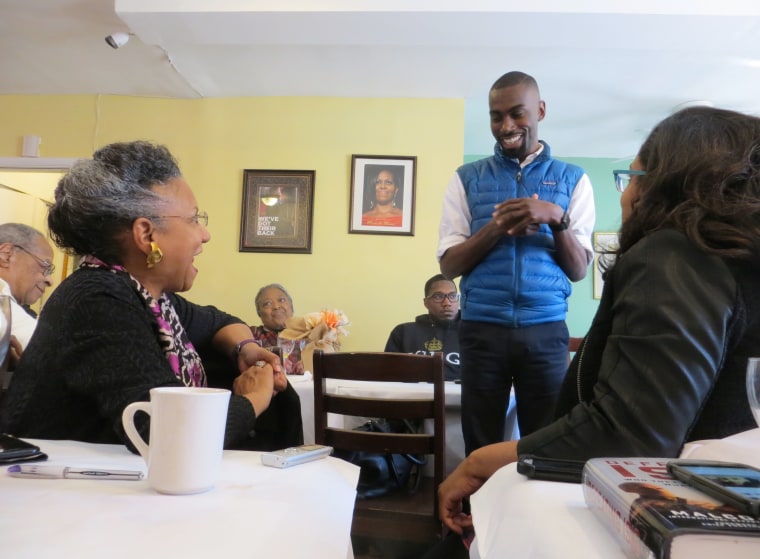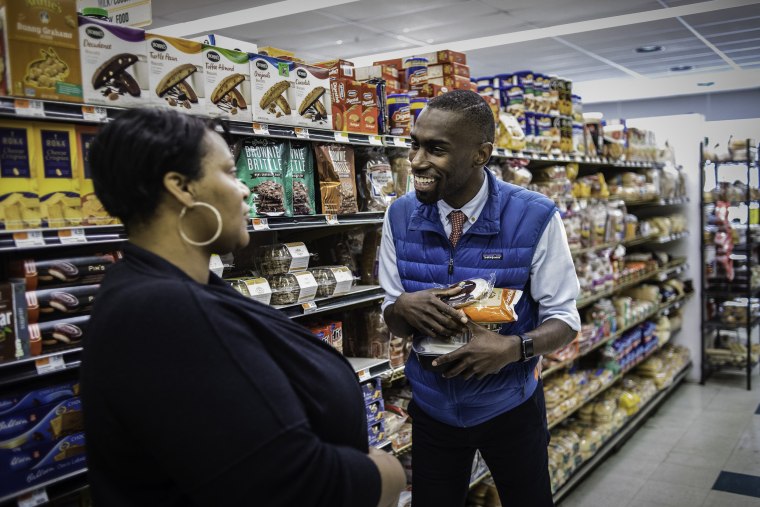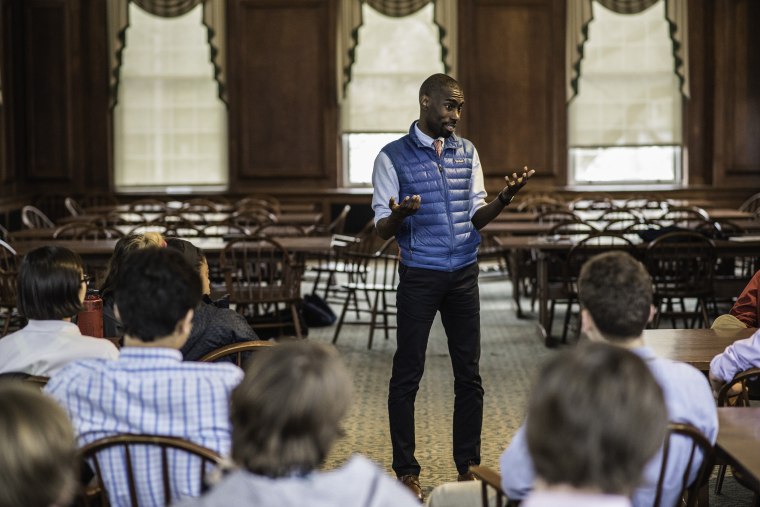
Activist and Mayoral candidate DeRay Mckesson met with a group of Black journalists this weekend in Washington, D.C., for a candid discussion that ranged the moment he became a protester, to the future of the Black Lives Matter movement, to his low poll numbers.
The group invited Mckesson as part of a gathering of journalists organized by veteran media reporter Richard Prince that has conducted dinner and brunch interviews of newsmakers since 1999.
Mckesson rose to national prominence, along with several other young activists, after the August 2014 shooting death of unarmed teenager Michael Brown, Jr. at the hands of former Ferguson Police Officer Darren Wilson. Since then, there have been several state and federal legislative victories that have resulted from the Black Lives Matter movement founded in the wake of the 2012 acquittal of George Zimmerman in the shooting death of unarmed teen Trayvon Martin.
Mckesson spoke on the strategies around being an activist and his work in founding Campaign Zero to pinpoint a specific list of state and local policy demands.
"People will always need a push from the outside but people also have to be on the inside doing the work," he said about the need to push policy inside the system.
RELATED:'Black Lives Matter' Activist DeRay Mckesson Files to Run For Baltimore Mayor
"Some people are more interested in fighting than winning. As a protester, I protested because I had to not because it was exciting. I don't want to get tear gassed again. I did it because I felt like we had to. I do think there are people who are interested in the fight being prolonged forever and I think that is a dangerous way to be in the work," Mckesson said.
Mckesson spoke of his campaign to become the next Mayor of Baltimore and the future of the Black Lives Matter movement. He also talked about the many meetings he's been a part of with President Obama, former Secretary of State Hillary Clinton (D-NY) and Sen. Bernie Sanders (I-VT).
On the tumultuous events in Ferguson following the shooting of Brown, Mckesson told the journalists that he packed and headed for Missouri shortly after hearing about Brown's death and was soon looking down at his feet to find two tear gas canisters.

"It was in that moment that I became a protester. It was then that I said I'll change my work," Mckesson said.
"When I think about protest, I worry so much that people think about it only as standing in the streets. And I say that as someone who has been standing in the streets of cities across the country - but at the root of it is this idea of telling the truth in public," said McKesson.
"Protest is not the solution. Protest creates space for the solution."
"As a candidate, and hopefully as Mayor, it is about telling the truth that cities don't have to be like this, and that we can actually do concrete things to make people's lives better," he added standing and talking on the second floor of the Crown Bakery, a popular Trinidadian restaurant in Washington, DC.
Mckesson added that the movement must ask two questions moving forward. First, he believes the new movement must ask what it can do alongside "people who might not have the same goals but have the same outcomes" and what coalitions can be built with other activists and advocates.
RELATED: How 'Black Lives Matter' Activists Are Shaping the 2016 Campaign
And second, he said the movement must ask: "Can we be as organized on the inside as we are on the outside? I think that has to be the next part of the work if we are going to do anything beyond changing the conversation. Protest is not the solution. Protest creates space for the solution," he added.
Mckesson also directly addressed the question of a March 10th poll by the Baltimore Sun showing him below 1 percent. There are more than 15 candidates running for Mayor of Baltimore.
"A lot of people ask me about the poll. I'm low in the poll. The poll came out 30 days into my candidacy. Seventy-five percent of the people were age 50 and above and it was 100 percent landlines, which is not my demographic in any capacity," he said.
RELATED: Activist DeRay Mckesson Gives Speech About Being Black and Gay
"In the same way - if you'd polled the movement in 2014 they would have said go home," he added, in reference to the fact that many local and national figures implored people to stop protesting and taking to the streets after Michael Brown was killed.
"I didn't need a poll to stand in the street in 2014. It was the right thing to do. I didn't need a poll to run. It was the right thing to do. I don't need a poll to continue the campaign it was the right thing to do."
On March 29, pollster Cornell Belcher founder of the polling firm Brilliant Corners, released a poll showing that Black Lives Matter movement was selected over legacy civil rights groups as "the movement that speaks for me" by over 500 African Americans polled. The general shift from older civil rights groups to a newer and younger thinking may on the horizon sooner than anyone realized.
